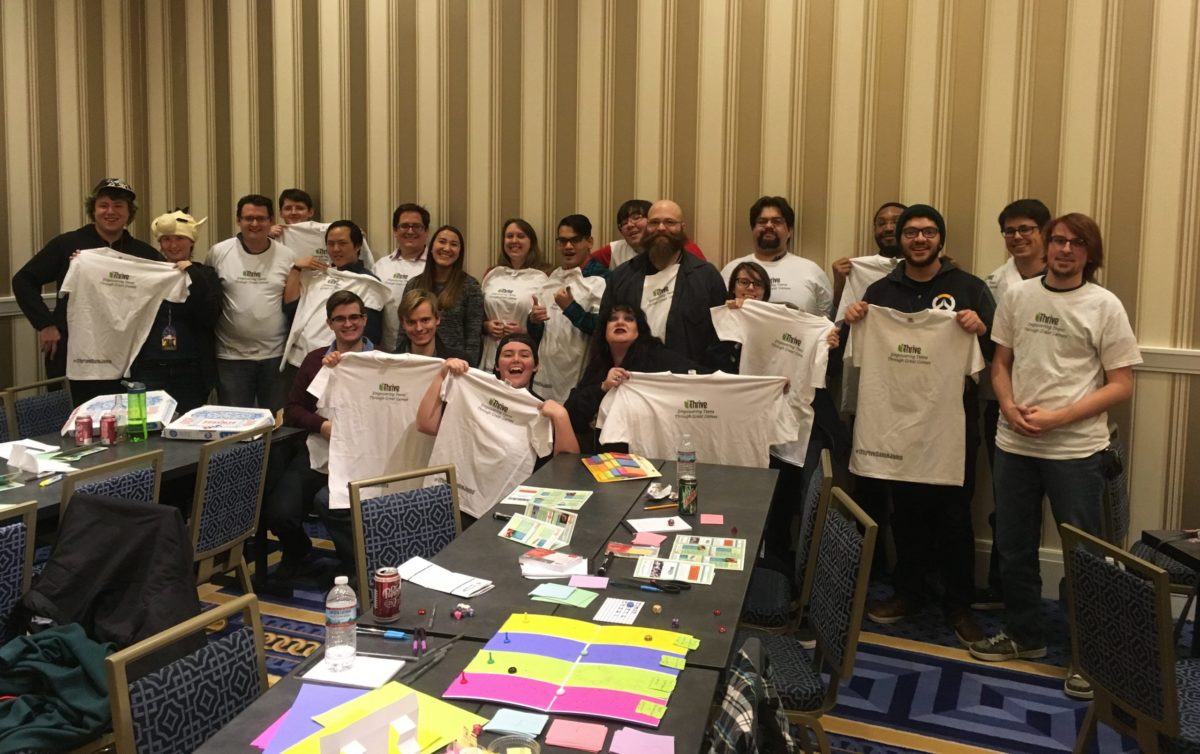
Design to Thrive: The MAGFest 2017 Game Jam
The halls were alive with the sound of electric guitars and dancing Pikachus...
...and amidst the levity and chaos, 28 game enthusiasts (many wearing delightfully goofy hats) gathered in the ballroom to tackle the question: How do we embed positive psychology into games?
This was the game jam that iThrive hosted last week at MAGFest 2017. Short for Music And Gaming Festival, MAGFest is an annual event that draws people from all parts of the world to celebrate video games, video game music, and gaming culture. And what is a game jam, you ask? It's a lively event where participants have a limited number of hours to think up and prototype an original game centered around a theme revealed at the start of the session. Participating takes the kind of creativity and passion that MAGFest attendees have in spades (as evidenced by the number of elaborate costumes on display, including too many Pikachus to count). We couldn't wait to engage these enthusiastic gamers in the challenge of designing games around one of our favorite things: positive habits.
Guided by iThrive creative director, Heidi McDonald, and expert jam consultant, Brad Hill, jammers had 9 hours to brainstorm, create, and present games designed around one (or more) of six habits teens can use to thrive: kindness, empathy, gratitude, optimism, zest, and purpose. We were super curious to find out what mechanics, themes, rules, or gameplay styles jammers would decide might best inspire players to use these skills.
Special Guest, James Portnow of Extra Credits, kicks off the jam.
After a few words from special guest James Portnow of Extra Credits, we started the clock and jammers were off to the races! We encouraged them to consider how to create thoughtful, real-time spaces for social interaction and to think "subtlety" in their designs (i.e., don't hit players over the head with the idea that this game is about kindness).
Jammers organized themselves into teams of 4 or 5, dug in, and found that designing a game around positive habits is deceptively complex and surprisingly rewarding. We left the jam with three key insights to apply to future experiments in game design grounded in positive habits:
1. Kindness and empathy inspired cooperative games!
The theme of positive habits "changed our idea," one team shared. "We walked in here with an idea for a game and then we realized our initial idea was selfish." Several teams echoed this idea that it was natural to design for self-interest (being empathic as a means to a selfish end), and jammers had to battle that tendency to stay true to positive themes. They found their ultimate workaround in cooperative (co-op) gameplay. The co-op approach allowed for the possibility of authentic feelings of kindness and empathy that weren't merely a path to coming out on top. In a jammer's words, "I may help someone else, but if it's always about my own self-interest, the kindness is incidental. But if you change up the win scenarios and allow for multiple winners, then there's an added benefit to everyone." Almost every completed prototype at our jam included cooperative components, which jammers reported as generally being more fun than competitive play.
Another jammer reflected, "This was an interesting way to think about co-op games. I usually prefer games where everyone is working towards the same goal, games where there's no room for bullying. I gravitate towards those games." Designing with prosocial behaviors like kindness and empathy in mind seemed to encourage the use of more inclusive and egalitarian gameplay styles.
2. Making games about positivity inspired creative thinking!
Teams who walked into the jam with preconceived plans to use specific systems and mechanics quickly found themselves in need of fresh ideas. "It forced us to think about games being more non-adversarial," said one team. "A lot of the fun game mechanics out there we wanted to leverage didn't work within the theme. But we were euphoric once we figured out how to do it." Another team added, "It really changed the direction of our game....working within the parameters of positive psychology, it forces you to be more creative." Interestingly enough, research shows that positive emotions broaden people's thinking and encourage cognitive flexibility, and we saw this phenomenon play out in jammers' approaches to the positive themes.
3. Positive themes produced positive player experiences!
Once the teams' ideas had come to life in the form of playable paper prototypes, it was time to see how players would engage with the "positive" games. Would the design intentions show up in the player experience?
Anecdotally, we can say that the positive games at our jam brought out the best in players (just check out those smiles in the picture below!). Throughout the ballroom, we heard players encouraging and supporting each other, exclaiming, "You can do this! You got this!" Ultimately, teamwork and unity were the big winners!
At the end of the jam, we all agreed that we had fun. Lots of it. And we were gratified to see that the themes of kindness, empathy, gratitude, optimism, zest, and purpose made their way into more than just the game mechanics. They infused the design process itself and fostered a palpable positivity among those playing the prototypes. Our jammers mined for positivity in some unexpected places (evil clowns, neuroses, battling mad kings), and each team brought a special zest to their designs. Although the theme manifested differently across the teams, a commitment to positivity brought it all together.
iThrive looks forward to our next jam in partnership with DePaul University in Chicago in March 2017. Stay tuned for more details!


